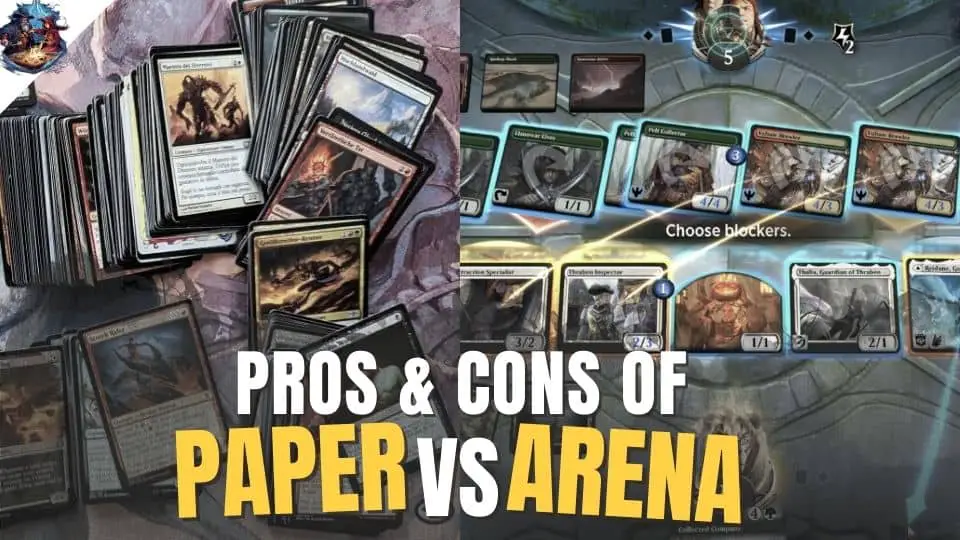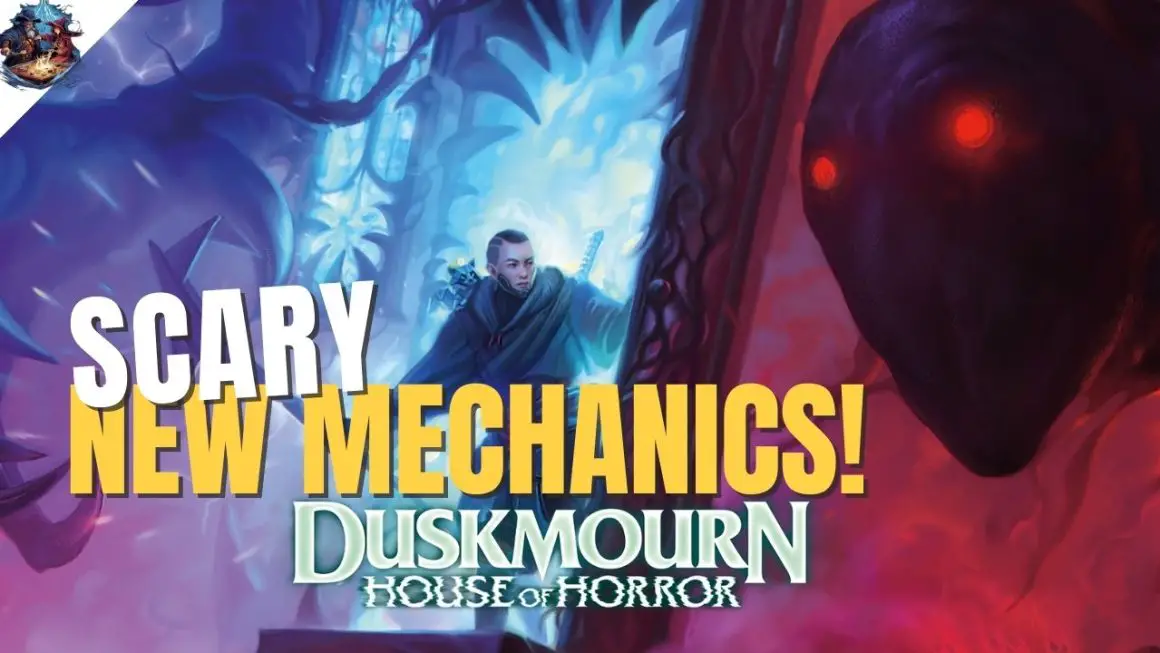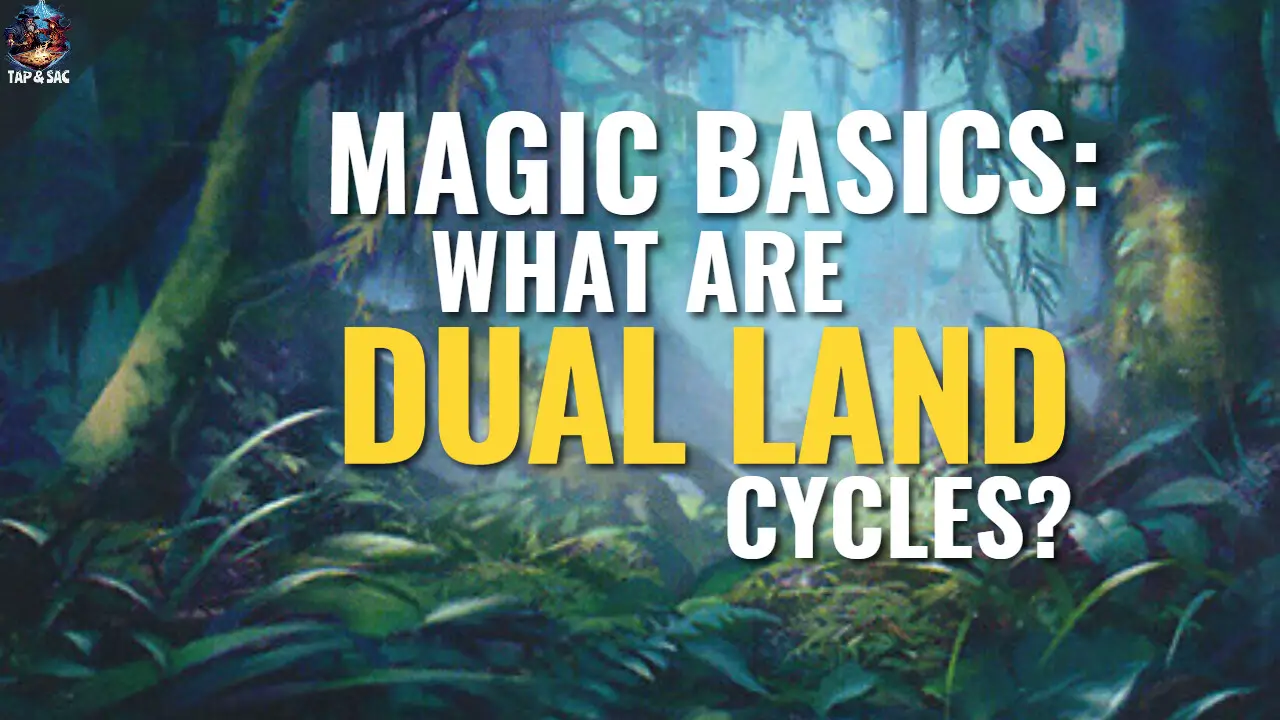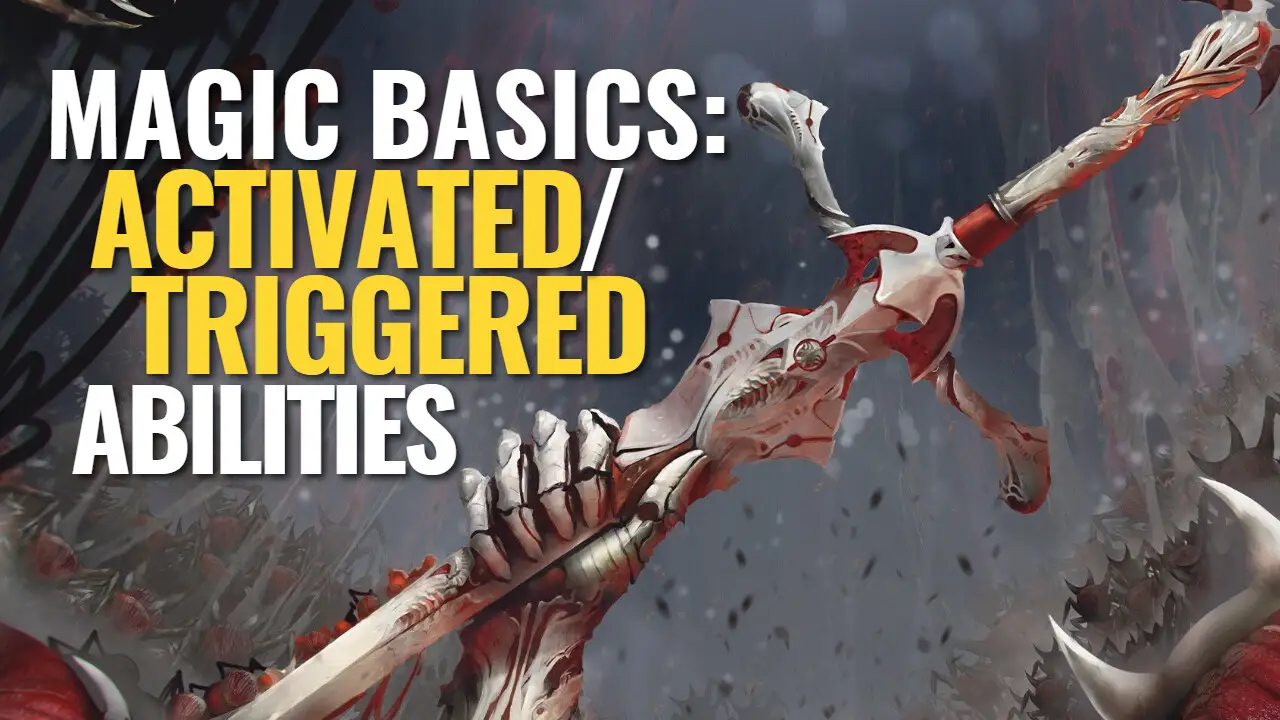Magic: the Gathering (MTG) is a huge game with a deep trove of cards, formats and history. You can play the traditional way with physical cards, or play digitally with their newest platform Arena. Since you can’t share cards between the two (owning the physical card doesn’t give you a free digital copy), there are benefits to sticking to one medium – but which one?
We look at 6 categories and weigh the pros and cons when it comes to Paper vs Arena:
Available Formats in MTG Paper vs Arena
It’s important to know what formats are available on each platform before committing to it. Both mediums have their unique formats alongside universal ones. Here’s what you can find on MTG Arena (colored formats are unique to the medium):
- Standard
- Alchemy
- Explorer
- Brawl
- Draft
- Sealed
And here’s what’s available on MTG Paper:
- Standard
- Pioneer
- Modern
- Vintage and Legacy
- Commander
- Draft
- Sealed
MTG Arena has the Alchemy format, with special digital-only cards and mechanics, while Explorer is a miniaturized version of Pioneer in paper. Likewise, Brawl is a 60-card variant of Commander where you can have a Planeswalker be in the Command Zone as well.
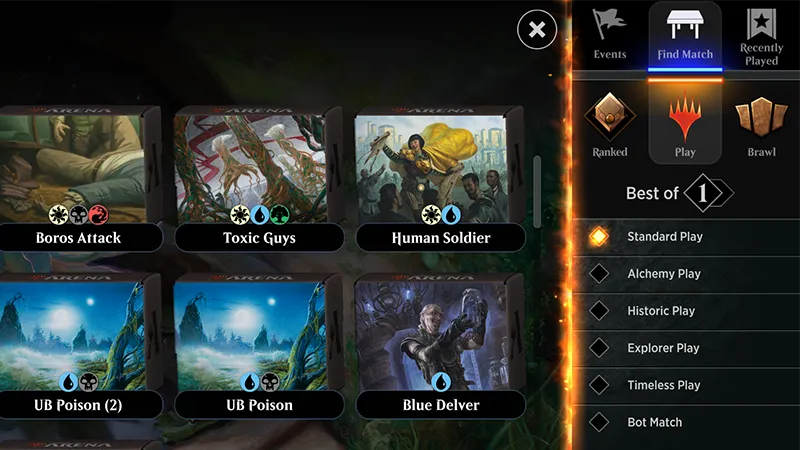
MTG Paper has the fan-favorite Commander, something that Arena is unlikely to have in a very long time. It also has the competitive Modern, Legacy and Vintage formats that long-time and enfranchised players love to play because the meta shifts are not that drastic.
Both mediums are consistent when it comes to Standard, Draft and Sealed (played mostly at Prerelease events). To us, MTG paper offers a lot more options, including the casual format Commander, something that Arena may never offer. Alchemy is Arena’s strongest case, but as a higher-powered Standard, it’s not going to overthrow Commander in fun and range. Winner: MTG Paper
Deck Building in MTG Paper vs Arena
Paper Magic: the Gathering cards may appear thin, light and easy to handle, but play long enough and you realize that storing or sorting cards becomes a real time-consuming affair. Cards are usually stored in long boxes, or Bundle boxes (one of the perks of buying those). Imagine every time you want to build a new deck, you have to sift through those hundred (or maybe thousands) or cards to find the ones you need. Building a new deck could take an hour or more, especially if you didn’t properly sort out your cards before.
On MTG Arena, all it takes is to type in several letters or words to find a card to add into your deck. Once a card is added, it’s simple to plus or minus cards to get your desired. In minutes, you can have a full 60-card deck plus 15-card Sideboard ready to go. If you’re brainstorming and trying to find cards that have certain keywords, color or card type, those options are readily available on Arena as well.
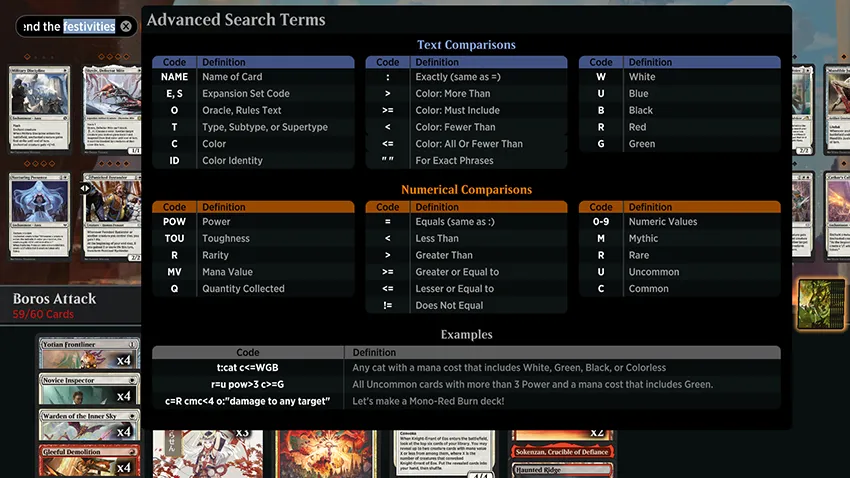
Unless you love spending hours sorting through thousands of cards in a dozen long boxes, you’ll find deck building a lot more enjoyable on Arena. Winner: MTG Arena
Collecting (and Trading/Selling) in MTG Paper vs Arena
Magic: the Gathering was one of the world’s first trading card games, and today it’s still one of the largest. New sets are released almost on a monthly schedule now, revolving between Standard Premiere releases, reprint sets, or Universes Beyond crossovers. Because of that, there’s a healthy dose of secondary trading, buying, or selling of single cards. When you buy physical booster packs from the local game store, you could open a chase card or ultra-rare variant foil that can be worth more than what you paid for it. Collecting real cards also looks mighty impressive in your card binder. The modern game is filled with art variants, foil variants and even different card frames.
On MTG Arena, every card earned stays within the digital ecosystem. MTG Arena’s card system should not be confused with the older MTG Online, where cards can be sold to other players for tix and then converted to real cash. On MTG Arena, there is currently no way to transfer cards among players/accounts, and we don’t expect that to ever change. If you’re someone who enjoys running your fingers through card binders, or enjoy the thrill of scoring a small profit from buying and selling cards, you’ll likely find MTG Arena boring.
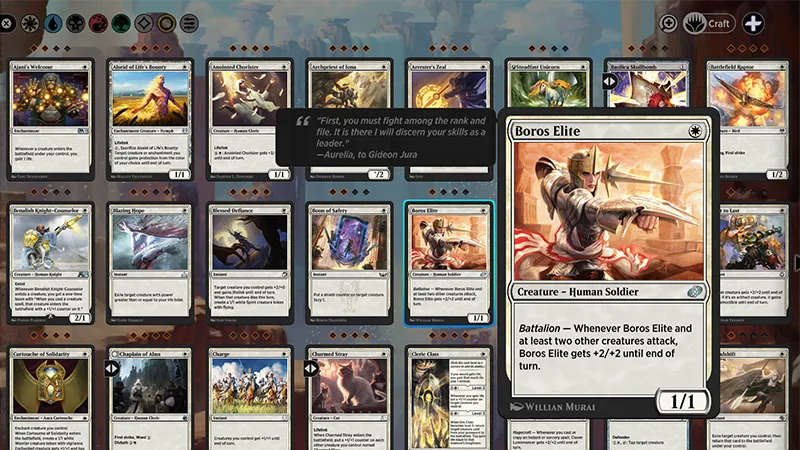
When it comes to showing off your collection to friends, or the ability to earning some cash to support your hobby, MTG paper undisputedly comes out on top over Arena. Winner: MTG Paper
Shuffling in MTG Paper vs Arena
Shuffling is an art, and a very key component to play Magic: the Gathering properly. Shuffling creates randomization for your deck, so that you’re able to draw enough Lands and not have too few or too many at one time. Without good shuffling, not only are you affecting the outcome of your games, it could be call out as cheating by the opponent, opening another whole can of worms.
Shuffling on paper also gets tricky when you’re dealing with 100-card Commander decks. 100 single-sleeved cards are already significantly thick enough to cause problems for smaller hands, meaning you often have to split the deck into two halves and then shuffle each one by one. It’s a tedious and time-consuming process, and don’t forget that for every mulligan you take, that’s an additional round of shuffling. More shuffling time means less time to play.
MTG Arena does all the shuffling and drawing for you, saving lots of time. Wizards of the Coast has stated time and time again that the game runs one of the most rigorous randomization algorithms out there, but there are countless feedback posts from players regarding drawing too few or too many Lands, or even all 4 copies of a card in the early stages of the game. We’ve personally drawn just a few Lands in the first 15 cards, though those are rare occurrences. Some have even done comprehensive studies over how randomized Arena’s shuffler is, so each player will have to come to their own conclusion.
If you trust your hands rather than an algorithm and have no problems taking time to shuffle while impacting game time, then MTG paper is the way to go. However, if you’re like us and find shuffling cumbersome and value game time over everything else, digital works best. Winner: MTG Arena
Gameplay in MTG Paper vs Arena
For the most part, gameplay for MTG Paper vs Arena are very similar. Players tap Lands for Mana, tap Creatures to attack, assign blockers one by one, and discard cards when necessary. You also have to carry out triggers on the Stack.
When playing on paper, it’s the responsibility of the trigger’s controller to monitor what needs to be done at, for example, your Upkeep step or End step. If you miss it, it could be considered as gone (depending on the severity and the competitive level of the game). When there are many spells and triggers on the Stack, that’s where it can also get convoluted, and arguments may erupt between players. It’s all part of the experience of playing on paper – some find it okay while others could think it’s a turnoff.
On MTG Arena, the game has tried its best to remove (or at least reduce) the minor steps of playing Magic. Here are some things that Arena does for the player automatically:
- Automatically assign and tap Lands when you cast spells
- Triggers automatically go on the Stack
- Damage and recovery is always done automatically
As you can see, MTG Arena removes the hassle of keeping track of life totals, counters, damage, and even triggers. This also cuts out any disagreements between players over rules and trigger resolution that didn’t go as designed. You can focus completely on strategy and need not worry about the nitty-gritty. Winner: MTG Arena
Social Aspect in MTG Paper vs Arena
Why do people play games? A big reason would be to interact with others and make friends – the social aspect. When Magic: the Gathering first began, it was a common sight to see school kids gathering around the kitchen table or outside game stores. The ground became the Battlefield and friends cherished a laugh over their sleeveless cards getting scratched. The social factor not only still exists today, it’s the main pull factor for Commander, the game’s most popular format. The banter between players in a multiplayer Commander game brings a certain kind of joy that was just plain absent in traditional 1-v-1 games (many of which tended to be in competitive events).
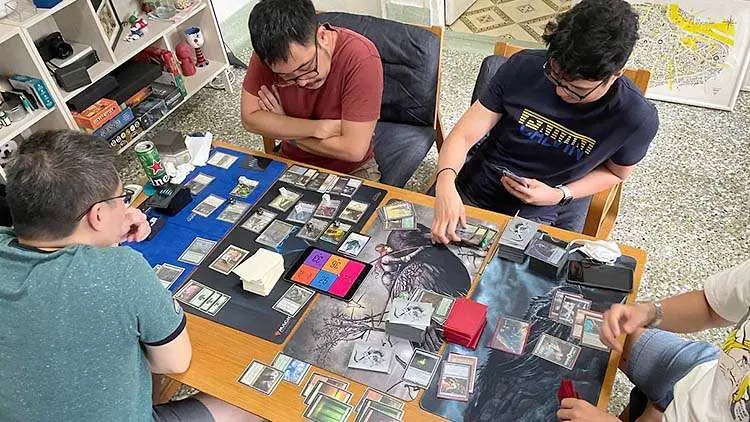
MTG Arena is cold as ice when it comes to the social aspect. Even worse, because it is faceless and there is no threat of retribution, you’ll find all kinds of inconsiderate behavior online. For example, spamming emotes to annoy you, or leaving a game dangling when they are about to lose, leaving you to wait out the timer. One could say Arena is all business, where joy is derived from wins rather than the process of playing Magic.
End Step
As you’ve surmised, each medium has its pros and cons, and it’s up to you to look deep within to find out which factors are high on your list. If convenience and cost are more important, then MTG Arena checks lots of those boxes. However, if the social aspect of playing the game supersedes everything else, then you really can’t go wrong with paper MTG.

